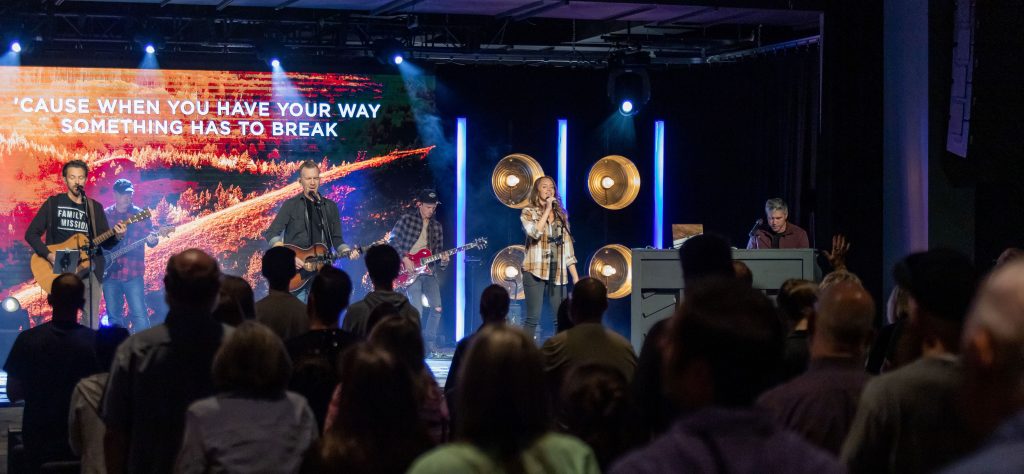

Choosing a church home is an important decision. We are committed to assisting with the process, regardless of the outcome. We desire to help individuals discern whether God is calling them to commit to Church of the City as their home. Many churches refer to this commitment as church membership. We choose to identify it as being a Stakeholder. We find this distinction important because we have a shared interest in God’s specific work in and through COTC.
August 29
Thank you for your interest in becoming a Stakeholder at Church of the City, register below for our next class on August 29.
Frequently Asked Questions
When Jesus announces in Mark 1:14 that “The time has come,” he said. “The kingdom of God has come near. Repent and believe the good news!” The Holy Spirit gives hearing and response to Jesus’ announcement and the church is birthed. It’s Jesus’ announcement of the kingdom that draws our community forward toward the day when God’s reign will be fully established on earth again and calls us to enter into the kingdom now as God’s kingdom people. In this way, the church is a both a preview of what is to come and an agent of renewal as the eternal kingdom of God is established among us. The prayer of Habakkuk captures our heart’s desire as we anticipate the fulfillment of God’s kingdom.
“Lord, I have heard of your fame; I stand in awe of your deeds, Lord. Renew them in our day, in our time make them known; in wrath remember mercy.” – Habakkuk 3:2
OUR VISION – TO SEE THE FAME AND DEEDS OF GOD RENEWED AND KNOWN IN OUR TIME.
Who we seek to be and all we desire to do is in response to Jesus’ announcement that the kingdom is at hand and the declaration that our Creator God is making all things new. As the Holy Spirit gives hearing and response at Jesus’ announcement we are ourselves enter the process of being made new. Discipleship is the word we use for this process of renewal and formation.
And discipleship is the primary way Jesus has invited us to participate in the kingdom.
Then Jesus came to them and said, “All authority in heaven and on earth has been given to me. Therefore go and make disciples of all nations, baptizing them in the name of the Father and of the Son and of the Holy Spirit, and teaching them to obey everything I have commanded you. And surely I am with you always, to the very end of the age.” – Matthew 28:18-20
Our primary mission as a church is to make disciples of Jesus in order that more and more people may receive and enter into the kingdom of God announced by Jesus.
OUR MISSION – PRACTICING THE WAY OF JESUS.
- Presence of God: We pursue the presence of God through individual & communal spiritual practices.
- Formation of People: We pursue deep change through transformational discipleship focusing on growth & healing.
- Unity of the Church: We pursue the unity of the church family across racial, political, generational & economic divides.
- Flourishing of the City: We pursue the spiritual, social & cultural flourishing of our city.
Choosing a church home is an important decision. We are committed to assisting with the process, regardless of the outcome. We desire to help individuals discern whether God is calling them to commit to Church of the City (COTC) as their home. Many churches refer to this commitment as church membership. We choose to identify it as being a Stakeholder. We find this distinction important because we have a shared interest in God’s specific work in and through COTC.
COVERING
Protection, Care
COTC is led and governed by an elder board, with members appointed and affirmed by Stakeholders. These elders exercise spiritual and financial oversight and governance of COTC. Our staff and leaders are accountable to these elders (1 Timothy 5:17). The elders, pastors, and leaders of COTC desire to serve in a manner reflective of 1 Peter 5:1-5 and take seriously the responsibility to contend for the integrity of the church because of the type of resistance noted in Acts 20:29-30.
COMMUNITY
Accountability, Discipleship, Missional Community
God calls us to dwell in community, and Scripture demonstrates and instructs us in how to pursue unity. Being a Stakeholder does not grant salvation (Acts 4:12), but does provide a biblical covering and the many benefits of community. Being a Stakeholder provides the opportunity to be encouraged toward and accountable to living a Christian lifestyle (Romans 12:11-16). It also provides us an opportunity to be challenged in more intentional ways by brothers and sisters who have the same aim to please Christ and to confess and repent in community. We believe one of the best ways to experience life together in Christ is when we are a part of Missional Communities and smaller groups. In this, we also become an extension of God’s church throughout our city and are best prepared to advance the kingdom of God on earth as it is in heaven (Acts 2:42-47).
COMMISSION
Sharing the Gospel, Cultural Renewal, Loving Your Neighborhood
It is a joy to share the love of Jesus and the message of the gospel in our city and with those around us. The Bible clearly reminds us to be mindful of others as we pursue Christ. As a Stakeholder of COTC, you will be equipped and provided specific opportunities to do just that (Matthew 28:18-20). When we are unified as Stakeholders, we begin to think differently about how we can be best equipped to love and serve our neighbors well with a shared purpose and focus (Matthew 6:10).
COMMITMENT
Gathering, Participating, Serving the Body
One of the signs of the kingdom of God is belonging. Our hearts long for this, yet our tendency is to keep our options open. We believe that we can’t have community without commitment. Becoming Stakeholders signifies our commitment to partnering with one another and contending for the health and work of the church. Every Stakeholder has a unique gift that is needed for our church to thrive and truly be at its best for the advancement of the kingdom of God (1 Peter 4:10). In our hope to be a church that loves and serves people well, we commit to serve our body in a specific capacity and remain aware of the present needs of COTC and meet those needs when able. (Galatians 6:10; John 13:34-35).
Church of the City (COTC) is a nondenominational church that believes in the authority of the Christian Scriptures for our life and practice. Three documents—the Apostles’ Creed, the Nicene Creed, and the Evangelical Statement of Faith—embody the tenants upon which COTC is founded.
THE FATHER
The first person of the Trinity orders and directs all things according to His purpose and pleasure. He has created humanity to bring Him glory and honor, through His grace. While He is transcendent, He is also actively involved in His creation—offering an eternal relationship with us through His Son, Jesus Christ. (Matthew 6:9; John 5:19-24; Ephesians 1:3-6; 2:1-10)
THE SON
Jesus Christ is both the eternal Son of God and virgin-born Son of man. Fully God, fully man, He surrendered nothing of His deity during His earthly life. His sinless, sacrificial offering on the cross satisfied the Father’s justice, offering atonement for all of humanity’s sins for all time. We believe in His bodily resurrection, His physical ascension, and His visible return back to earth to establish His earthly kingdom. (John 1:14-18; Colossians 1:15-20)
THE HOLY SPIRIT
The Holy Spirit executes the will of God in this world through humanity by leading, guiding, filling, teaching, and convicting. The Holy Spirit is not merely an impersonal force, but is a person, displaying the qualities of personhood (intellect, emotions, and will). The Holy Spirit equips believers upon conversion by giving them gifts to be used for the building up of the church and by bearing fruit through their yielded lives. (John 16:7-11; Ephesians 2:10; Ephesians 1:13-14; Galatians 5:22-25)
HUMANITY
We are created in the image of God, destined to enjoy an intimate relationship with Him and one another, fulfilling His will here on earth. Through Adam and Eve’s willful sin in the garden, sin entered the world and has infected all of humanity. Due to our inherent sinful nature received from our father Adam, we are separated from God, spiritually dead, and destined for physical death and an eternity removed from God. (Genesis 1-3; Romans 1:18-32; Romans 5:12-21; Ephesians 2:1-3)
SALVATION
Jesus Christ died for our sins as the only sufficient sacrifice, offering atonement for the sin of all mankind through His death, burial, and resurrection. While salvation is available to all, it is only experienced by those who receive His gracious gift by faith, apart from works. As a result of our new relationship with God through His Son, Jesus, we are called to a life of submission to the Holy Spirit, manifesting spiritual fruit, and walking in good works that God has prepared beforehand for us to do. (John 14:6; Acts 4:12; John 1:12; Ephesians 1:7, 2:8-9; Hebrews 10:10-14; 1 John 5:11-13; Galatians 3:26; John 3:16)1-3)
THE SCRIPTURES
We believe every word in the original writings is inspired by God and is without error. The Word of God reveals God’s nature and will for all of humanity and is to be the foundation of faith and practice. We affirm that while God’s Word is accurate in all matters, it is not given as an end in and of itself, but rather a means to a relationship with God. (2 Timothy 3:16-17; 2 Peter 1:20-21; Hebrews 4:12; John 17:17)
THE CHURCH
All who place their faith in God through His Son, Jesus Christ, are a part of the universal body of believers known as the Church. The purpose of the local church is to lead people to Christ and bring them to maturity in Him. Members of the local church are to live lives in humble submission to other Spirit-led believers and to the God-appointed leaders of the church. COTC is an autonomous local assembly led by Jesus Christ, who directs as the head of this body through a team of appointed elders. (Hebrews 10:24-25; Acts 2:41- 47; 1 Corinthians 12-14; Matthew 28:18-20; Ephesians 2:19-22; 1 Thessalonians 4:15-17)
THE KINGDOM
At the end of all things, God promises to make all things new. He invites us, His followers, to join Him in this work of renewal on earth. The signs of His kingdom coming are salvation, joy, peace, justice, God’s presence, belonging, and healing. (Revelation 21:5)
NONESSENTIALS
We affirm that the doctrines of the Trinity, the deity of Christ, the bodily resurrection, the atoning work of Christ on the cross, and salvation by grace through faith make up the essential, distinctive nature of Christianity. We acknowledge that there are peripheral, nonessential doctrines that are important but not critical to the follower of Christ as it relates to salvation. While COTC may hold positions on these nonessentials, we will not allow these doctrines to cause division within the church. We will accept into our body those who have differing views on the nonessential doctrines but will not allow those of a different opinion to fracture the church.
The central themes of Jesus’ 14 teachings in the Sermon on the Mount address the issues of money, sexuality, and power. We desire to experience the deliverance of the kingdom of God in these areas and to put on display tangibly what it looks like to walk in the way of Jesus. It is important for our tone that we seek to define what we are pursuing rather than simply what we are avoiding and therefore we have framed these three categories as a pursuit of:
1. Generosity (Our money ethic)
2. Faithfulness (Our sexual ethic)
3. Servanthood (Our power ethic)
GENEROSITY
God is a generous God who gives generously to all without finding fault. God demonstrates generosity in not sparing the Son, but freely giving him to us (Rom. 8). Paul says of Christ, “He who was rich became poor that by his poverty we might become rich.” Generosity is at the heart of who God is and it is at the heart of the kind of people he invites us to become. Generosity is about more than money. It is about time and abilities as well. We are stewards, meant to see life as a gift that is stewarded for the glory of God. In the bible, this fundamentally means we take on a vision of abundance over scarcity.
FAITHFULNESS
How we relate sexually is a critical arena for Christian proclamation and instruction, but one that is often neglected due to fear of giving offense or simply embarrassment and shame. We hope the following offers some clarity in this important issue.
We believe God’s design in creation is that marriage is constituted by the committed, faithful relationship between one man and one woman, in which they become one flesh in a new social unity that is distinct from their birth families, and that sexual intercourse as the expression of that ‘one flesh’ is to be enjoyed exclusively within the bond of marriage. This loving sexual union, in which ‘two become one’, reflects both Christ’s relationship with the Church and also the unity of Jew and Gentile in the new humanity.
We recognize our need for deep humility and consciousness of failure in this area. We long to see Christians challenging our surrounding cultures by living according to the standards to which the Bible calls us. Our church will always be a place where the dignity of all people is respected with love, kindness and empathy.
SERVANTHOOD
In our corruption by sin, power is often exercised to abuse and exploit others. We exalt ourselves, claiming superiority of gender, race, or social status. Paul counters all these marks of power abuse with his requirement that those who are filled by God’s Spirit should submit to one another for Christ’s sake. Such mutual submission and reciprocal love is to be expressed in marriage, family, and socio- economic relations. Jesus teaching on power is crucial here. There arose a reasoning among the disciples, which would be the greatest. Jesus rebuked this mentality calling them to humble service. He said of himself, “The Son of man has not come to be served, but to serve and to give his life as a ransom for many.” This is the pattern of Jesus for power.
To become a Stakeholder, an individual must be high school age or older and in full understanding of the commitments connected to this distinction. A Stakeholder of COTC is responsible for participating in the life and mission of the church by following Christ and seeking to live as He would live. We commit to do so according to the following premises:
AUTHENTICALLY PROFESS FAITH IN CHRIST
The local church is a body of believers in Jesus Christ, seeking to be His hands and feet on earth (Ephesians 4:4-6). It is under this shared belief that we unite as a local expression of the body at COTC. We have professed our faith and have publicly identified with Jesus and His church through baptism.
COMMIT TO LIVING AS A FOLLOWER OF CHRIST
We commit to continually be moving toward living a life that is a reflection of the love and the way of Jesus. We commit ourselves to the practices of the faith, as well as relationship and discipleship with fellow believers (Galatians 3:27).
PROTECT THE PEACE AND PURITY OF THE CHURCH
We believe we are called to fight to preserve peace and not to participate in sowing discord and disunity in the church. As Stakeholders, we commit to forgiveness, reconciliation, and restoration as guideposts for relationship (Ephesians 4:32).
SUPPORT THE WORSHIP AND PRACTICES OF THE CHURCH
We commit to move toward regularly attending and faithfully praying for our gatherings and to partake in the Lord’s Supper (Hebrews 10:24-25). We also commit to move toward the practice of generosity in God’s kingdom through financially giving to our local church (1 Timothy 6:18-19).
SERVE AND REINFORCE THE MISSION OF THE CHURCH
We commit to identify our gifts, serve our body in a specific capacity, and remain aware of the present needs of COTC. (1 Peter 4:10). We will also commit to moving toward participation and engagement with a Missional Community. We believe that this is a venue in which both spiritual development and engagement with our neighborhoods for the gospel can occur (Acts 5:42).
As Stakeholders, we have the right and responsibility to influence the key decisions of the church, most importantly through the selection and affirmation of elder candidates. Stakeholders also receive priority for facility usage and staff members’ time (such as weddings, funerals, benevolent needs, and personal support in your area of ministry). From time to time, meetings or other functions are held for “Stakeholders only.” These events are usually called either to inform the church about a major concern or to garner input from the body; therefore, they are limited only to those who are participating Stakeholders. Finally, leadership positions in the church require being a Stakeholder as a prerequisite. The primary reason to become a Stakeholder, however, is not to gain a personal advantage, but to identify with and live according to the values of COTC.




